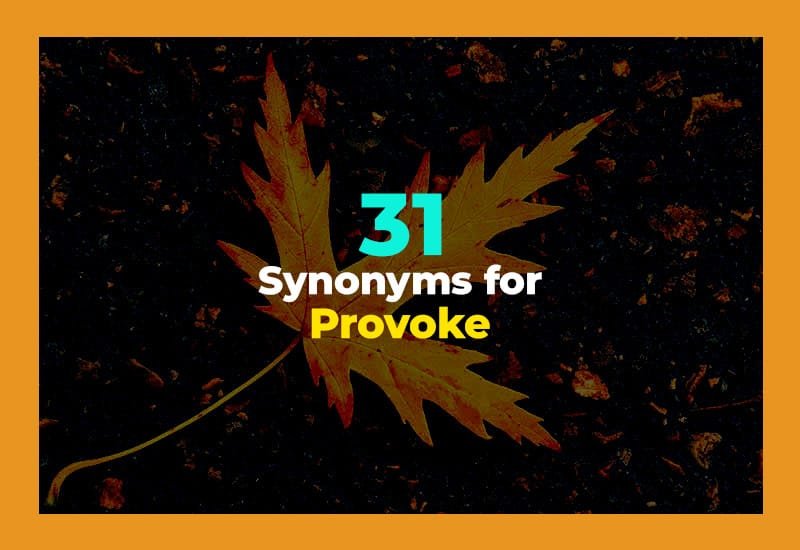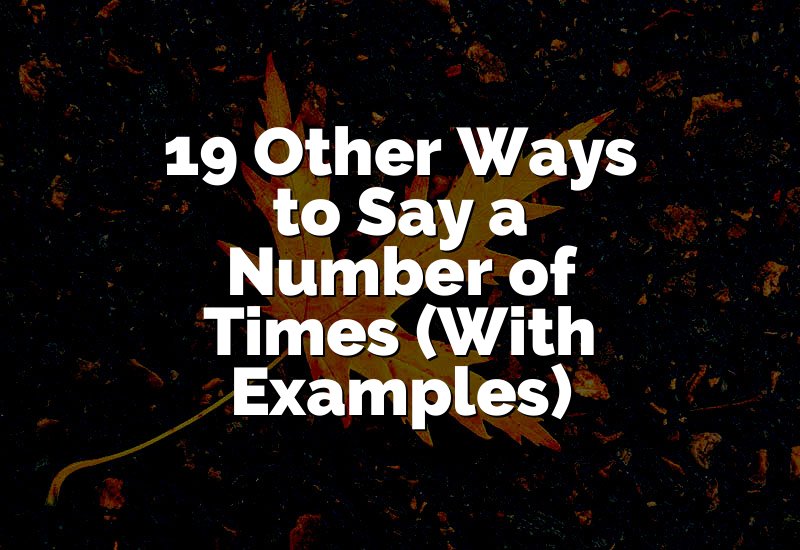Sometimes, we want to say "provoke," but it sounds a bit too strong or repetitive. Words like "trigger," "annoy," or "inspire" can fit better depending on the situation. Each synonym has its own shade of meaning and use. In this article, we'll explore 31 different words you can use instead of "provoke," with easy examples for each.
31 Different Ways to Say PROVOKE: Another Word for Provoke
1. Arouse
Arouse means to wake up or bring out a feeling, emotion, or reaction in someone. It's often used when something creates excitement, curiosity, or even anger. This word is softer than "provoke," but it still shows a strong emotional effect. You can use "arouse" in both positive and negative situations, like arousing interest or arousing anger. It's common in writing and conversation when describing emotional reactions.
- The movie aroused deep emotions in the audience.
- His speech aroused hope among the people.
- The strange sound aroused my curiosity.
2. Elicit
Elicit means to draw out or bring forth a response, usually from a person or group. It's often used when someone's actions or words make others share feelings, opinions, or reactions. This synonym is more neutral and polite than "provoke." You can use it when talking about getting feedback, emotions, or answers. It's common in formal writing or conversation.
- The teacher's question elicited thoughtful answers.
- His joke elicited laughter from everyone.
- The news elicited strong emotions from the crowd.
3. Evoke
Evoke means to bring a feeling, memory, or image into someone's mind. It's softer and more emotional than "provoke." You use "evoke" when something reminds someone of a past feeling or moment. This word fits well for art, music, and emotional memories. It doesn't usually mean causing anger, but rather awakening something inside the heart or mind.
- The old song evoked memories of my childhood.
- The painting evoked a sense of calm and peace.
- The smell of rain evoked nostalgia for home.
4. Trigger
Trigger means to cause something to happen suddenly, often a strong reaction or event. It can be used for both physical and emotional responses. It's often connected to things that set off emotions or memories. In everyday talk, "trigger" can describe something that makes someone react quickly, whether with anger, fear, or excitement.
- The loud noise triggered the car alarm.
- His rude comment triggered an argument.
- The memory triggered her sadness again.
5. Spark
Spark means to start or ignite something, like an idea, emotion, or reaction. It gives a feeling of energy and beginning. You can use it to describe excitement, creativity, or even anger starting. This word is lively and works for both positive and negative feelings. It's a nice, simple way to describe something that starts an emotion or event.
- The discussion sparked new ideas.
- His words sparked a heated debate.
- Her success story sparked hope among others.
6. Stimulate
Stimulate means to encourage activity or excitement in someone or something. It's often used for ideas, growth, learning, or emotions. It's similar to "provoke," but it usually sounds more positive. You can use it for mental or physical energy. It's great when talking about motivation, creativity, or curiosity.
- The new teacher stimulated the students' interest in science.
- Coffee helps stimulate my mind in the morning.
- The art exhibit stimulated deep thought.
7. Generate
Generate means to produce or create something, such as a reaction, result, or emotion. It's a bit more neutral than "provoke" and often sounds professional. You can use it for both emotional and practical things like ideas, energy, or interest. It's perfect when you want to describe the act of causing something to exist.
- The announcement generated excitement.
- His speech generated a lot of discussion.
- The campaign generated positive results.
8. Induce
Induce means to cause something to happen, especially a feeling, action, or state. It's a formal word that's often used in medicine or science, but it can also be emotional. It's similar to "provoke" when describing causing something intentionally. It's great for describing actions that lead to reactions or emotions.
- The medicine induced sleep quickly.
- His apology induced a feeling of relief.
- The situation induced fear among the people.
9. Prompt
Prompt means to cause or encourage someone to do something. It's often used when an action or event makes someone respond or react. It's similar to "provoke" but sounds more neutral and gentle. You can use it in both casual and formal speech. It's great for describing things that lead to quick responses.
- His question prompted a long discussion.
- The teacher's praise prompted her to work harder.
- The incident prompted an investigation.
10. Inspire
Inspire means to fill someone with the urge or ability to do or feel something positive. It's one of the nicest alternatives to "provoke." Instead of causing anger, it causes motivation and creativity. It's often used for art, goals, and encouragement. You can use it anytime you talk about positive emotional influence.
- The story inspired me to chase my dreams.
- Her courage inspired everyone around her.
- The speech inspired hope in the audience.
11. Aggravate
Aggravate means to make a situation or feeling worse. It's often used for irritation, anger, or problems. This synonym fits when something or someone makes others more annoyed. It's stronger and more negative than "provoke." It's common when talking about frustration or worsening issues.
- His rude behavior aggravated the situation.
- The delay aggravated the passengers.
- Her constant complaints aggravated everyone.
12. Irritate
Irritate means to make someone slightly angry or annoyed. It's similar to "provoke," but it's softer and more everyday. You can use it when something keeps bothering or upsetting someone. It's perfect for small annoyances or ongoing frustration.
- The noise from the construction irritated me all day.
- His attitude irritates everyone in the office.
- That buzzing sound really irritates my ears.
13. Infuriate
Infuriate means to make someone extremely angry. It's one of the strongest words for "provoke." Use it when the reaction is deep anger or rage. It's perfect for situations where something or someone really upsets people. It shows a strong emotional explosion.
- The unfair decision infuriated the team.
- His rude words infuriated her.
- The delay infuriated the customers.
14. Enrage
Enrage means to make someone very angry or furious. It's very close to "infuriate" and stronger than "provoke." You use it when the anger is intense and hard to control. It's common when talking about actions that deeply offend or upset people.
- The insult enraged him.
- Her unfair treatment enraged the workers.
- The news enraged the public.
15. Exasperate
Exasperate means to irritate or frustrate someone to the point of exhaustion. It's like "provoke," but it shows ongoing annoyance. It's used when someone keeps doing something that wears your patience thin. It often describes mild anger and frustration rather than rage.
- His constant interruptions exasperated the teacher.
- The slow internet exasperates me.
- Her attitude exasperated her friends.
16. Incense
Incense means to make someone extremely angry or offended. It's stronger than "provoke" and is used for serious emotional reactions. It often involves deep moral or personal anger. It's formal and more common in writing, but still easy to understand.
- The unfair comment incensed the audience.
- His rude tone incensed his boss.
- The decision incensed many fans.
17. Annoy
Annoy means to make someone a bit angry or irritated, often by doing something repeatedly. It's one of the simplest and most common ways to say "provoke." It's mild and friendly for everyday use. It works well for small things that bother you.
- The buzzing mosquito annoyed me.
- His jokes annoyed everyone after a while.
- The delay annoyed the customers.
18. Irk
Irk means to irritate or bother someone slightly. It's softer and more casual than "provoke." It's used when something small gets under your skin. It's great for describing mild annoyance that isn't serious.
- His careless attitude irked me.
- The noise from next door irked her.
- It irks me when people don't listen.
19. Vex
Vex means to trouble or annoy someone, especially in a way that causes frustration or worry. It's a bit old-fashioned but still useful. It's stronger than "irk" but not as harsh as "infuriate." It's often used for mental or emotional irritation.
- His behavior vexed his parents.
- The delay vexed the team.
- Her silence vexed him deeply.
20. Needle
Needle means to tease or provoke someone in a playful or annoying way. It comes from the idea of poking like a needle. It's often used when someone keeps saying things to get a reaction. It can be fun or irritating depending on tone.
- He loves to needle his friends just for fun.
- Her sarcastic comments needled him.
- The fans needled the player after his mistake.
21. Instigate
Instigate means to start or cause something, often trouble or action. It's used when someone encourages others to act, usually in a negative way. It's more formal than "provoke" and often used for conflict or rebellion. It means to stir up something intentionally.
- He instigated a fight between the two groups.
- The rumor instigated panic.
- She was accused of instigating the argument.
22. Agitate
Agitate means to stir up feelings, usually of anger or excitement. It can also mean to shake or move something around. It's often used for emotions, protests, or political actions. It's similar to "provoke" but can be both emotional and physical.
- The news agitated the whole community.
- His speech agitated the crowd.
- The memory still agitates her.
23. Stir
Stir means to cause a reaction or emotion, often excitement or anger. It's a simple and everyday synonym for "provoke." You can use it for gentle or strong emotional effects. It's great when something moves people emotionally or starts action.
- The speech stirred the audience.
- His words stirred anger in many.
- The story stirred my imagination.
24. Goad
Goad means to push or provoke someone to act, often by annoying or challenging them. It's a bit old-fashioned but very expressive. It's used when someone keeps pressuring or teasing another until they react. It's often used for motivation or irritation.
- He goaded his rival into a fight.
- The challenge goaded her to try harder.
- His words goaded me into responding.
25. Prod
Prod means to push or encourage someone to do something. It can be physical or emotional. It's softer than "provoke" and often used for motivation. You can use it for friendly reminders or gentle persuasion.
- She prodded him to make a decision.
- The teacher prodded the students to study more.
- His curiosity prodded him to ask questions.
26. Pique
Pique means to arouse interest, curiosity, or anger. It's one of those flexible words that can be positive or negative. It's often used for emotional responses that come from pride or curiosity. It's perfect when something grabs attention or slightly annoys.
- The mystery piqued my interest.
- His attitude piqued her anger.
- The comment piqued his curiosity.
27. Taunt
Taunt means to mock or insult someone to make them angry or upset. It's stronger and more negative than "provoke." It's used when someone intentionally says mean things to get a reaction. It often happens in arguments or sports.
- The crowd taunted the losing team.
- He taunted his brother after winning.
- Her classmates taunted her for making a mistake.
28. Challenge
Challenge means to invite someone to test their ability or opinion. It's usually positive but can also cause tension. It's related to "provoke" because it pushes someone to act or respond. It's common in sports, debates, and personal growth.
- The teacher challenged the students to think deeper.
- His rival challenged him to a race.
- The question challenged her beliefs.
29. Rouse
Rouse means to wake or stir someone emotionally or physically. It's a softer version of "provoke." It's used when something awakens energy, excitement, or attention. It's perfect for emotional or motivational situations.
- The speech roused the crowd.
- The alarm roused me from sleep.
- The movie roused feelings of hope.
30. Enkindle
Enkindle means to set something on fire or start an emotion, like passion or hope. It's poetic and warm, often used for inspiration. It's a positive way to say "provoke" when describing strong feelings or creativity. It brings a sense of beginning something beautiful or powerful.
- His kindness enkindled love in her heart.
- The story enkindled a desire to travel.
- The teacher enkindled a love for reading.
31. Inflame
Inflame means to make emotions stronger, often anger or excitement. It's a powerful synonym for "provoke." It's used for situations where feelings rise quickly. It can be negative or neutral depending on context.
- His words inflamed the argument.
- The speech inflamed the crowd's passion.
- The rumor inflamed tensions between neighbors.
Table of Synonyms for Provoke
| Synonym | Example |
|---|---|
| Arouse | The movie aroused strong emotions. |
| Elicit | Her smile elicited joy from others. |
| Evoke | The song evoked old memories. |
| Trigger | The noise triggered the alarm. |
| Spark | The event sparked debate. |
| Stimulate | The teacher stimulated curiosity. |
| Generate | The idea generated excitement. |
| Induce | The scene induced fear. |
| Prompt | His question prompted a response. |
| Inspire | The story inspired everyone. |
| Aggravate | The noise aggravated the driver. |
| Irritate | The delay irritated passengers. |
| Infuriate | The unfair rule infuriated workers. |
| Enrage | The insult enraged her. |
| Exasperate | His behavior exasperated the teacher. |
| Incense | The comment incensed the fans. |
| Annoy | His joke annoyed everyone. |
| Irk | The delay irked me. |
| Vex | The issue vexed the manager. |
| Needle | He needled his friend playfully. |
| Instigate | The rumor instigated panic. |
| Agitate | The protest agitated the crowd. |
| Stir | The story stirred emotion. |
| Goad | His challenge goaded her. |
| Prod | She prodded him to start. |
| Pique | The idea piqued curiosity. |
| Taunt | The fans taunted the players. |
| Challenge | The coach challenged the team. |
| Rouse | The speech roused excitement. |
| Enkindle | The teacher enkindled creativity. |
| Inflame | The remarks inflamed anger. |

Final Thoughts
I hope this list of synonyms for "provoke" helps you find the perfect word for any situation. Whether you want to sound softer, more positive, or stronger, there's always a better fit. Words like "spark," "trigger," and "inspire" make your writing feel more natural and fresh. Try using different ones to express emotions more clearly and creatively.









